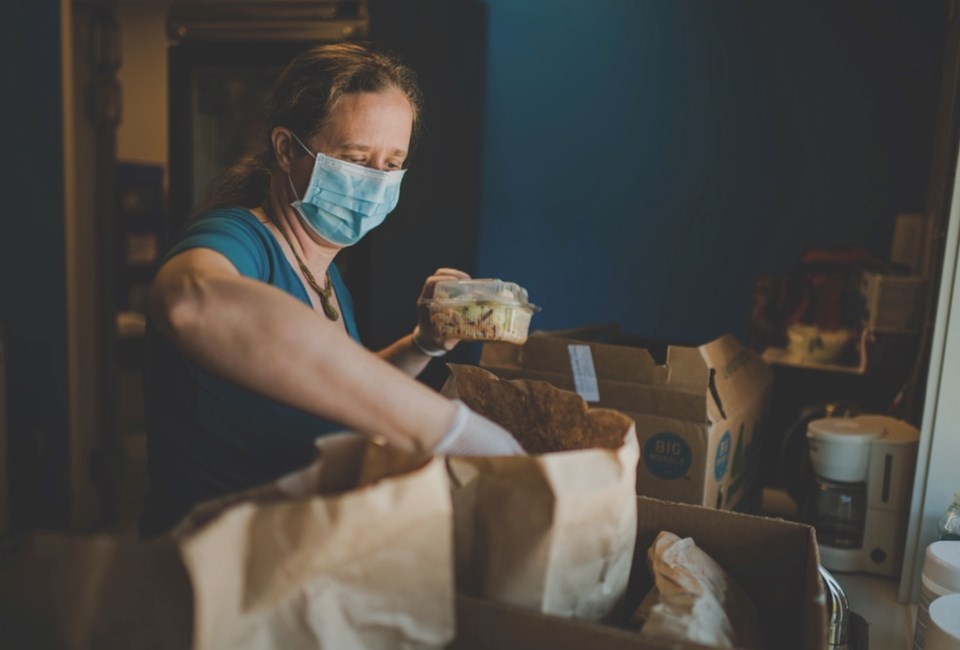Food banks across B.C. are anticipating a five-per-cent rise in demand over the next year, “as a result of the pandemic and a lot of economic uncertainty and turbulence and an unpredictable climate,” according to Whistler Community Services Society (WCSS) executive director Jackie Dickinson—and Whistler’s food bank is no different.
In Whistler, food bank visits were up 87 per cent in 2020 over 2019. That translated to about 1,400 monthly visits immediately after the onset of the pandemic. Visits to the food bank “levelled off” to about 500 per month in summer 2021, Dickinson said—but that’s still nearly twice the pre-pandemic average of about 250 visits per month.
While the holidays might be a popular time to donate, the Food Bank needs support year-round, said Dickinson. In Whistler, demand for its services used to fluctuate alongside the number of tourists in town, but that’s not necessarily the case anymore. The increased need prompted WCSS to launch an appeal for funds earlier this year.
The campaign saw WCSS surpass its $50,000 fundraising goal, said Dickinson.
“The philanthropy and giving in this community has been absolutely amazing and exceeded our expectations, and thankfully, [it’s] helping us fundraise the type of money that we need to sustain these types of programs now moving forward, because [our] budgets are three to four times what they were pre-pandemic,” she explained.
Adding to the pot is a $17,500 one-time contribution from the Squamish-Lillooet Regional District (SLRD), which also provided the same financial boost to three other local food banks in Lillooet, Pemberton and Squamish from its COVID-19 restart funds.
The day she learned about the contribution “was probably one of the best Monday mornings I’ve had in a really long time,” said Dickinson. “It’s money you need, but you don’t anticipate.”
Monetary donations like the SLRD’s can go a long way due to the Whistler Food Bank’s ability to buy much-needed items in bulk and at a wholesale price.
While those donating food items from their pantries are just as appreciated—“the big thing is that we always encourage people to consider non-perishable food items because they have a longer shelf life,” noted Dickinson—donors are reminded to double-check expiry dates and make sure cans aren’t dented.
Among the most needed non-perishable items are canned food rich in protein (like fish, chicken, beans and legumes), canned vegetables and fruit, soups, cereal and granola bars, peanut butter, rice, pasta and pasta sauce.
Donations can be dropped off at the Whistler Food Bank, which operates out of the WCSS building at 8000 Nesters Road, or in donation bins at local grocery stores. Bottles, cans and other refundable beverage containers can be donated at WCSS bins in Function Junction and Nesters.
Monetary donations can also be made to the Pemberton Food Bank, operated by Sea to Sky Community Services Society, online, or dropped off at 1347 Aster Street.
But during the holidays, sometimes locals are looking to help their neighbours out with more than just the necessities. For those interested in donating gifts, Dickinson recommended the Howe Sound Women’s Centre’s “fill a bag” project, where a new or gently used bag, backpack, or purse filled with items like new socks, mitts, toques, chapstick, shampoo, conditioner and other essentials can be dropped off at the Squamish (38021 Third Ave.) or Whistler Women’s Centre (1519 Spring Creek Drive). WCSS is also running its holiday hamper program this year, but rather than offering families boxes filled with toys and other items as it has in the past, is offering gift cards specifically chosen for each family’s needs and wants.
If one of your priorities is making sure animals in need aren’t forgotten this holiday season, local shelter Whistler Animals Galore (WAG) is also looking for a few gifts to put under the tree.
Among the items highest on its wish list (available to scroll and purchase on Amazon) are high-quality, large-sized dog harnesses, cleaning supplies and pet treats.
The shelter is also running a holiday fundraising campaign throughout the month of December, where all monetary donations up to $15,000 will be matched by Zog’s and Moguls Coffee House.
Whether it’s animals, people or the environment, how to give back to the community this season has been a frequently discussed topic in Dickinson’s home, she said, including in a letter one of her two sons recently received from Santa himself, courtesy of Canada Post.
“And [the letter] said to my son, ‘Remember Michael, that the greatest gifts you’ll receive this year are kindness, empathy and compassion. They’re not things you can wrap under a tree; they’re things that will last a lifetime,’ … So in the words of Santa, I would just tell any family as long as you’re providing opportunity to spread that kindness, empathy and compassion, I think our kids and our world are going to be OK.”
-With files from Braden Dupuis




